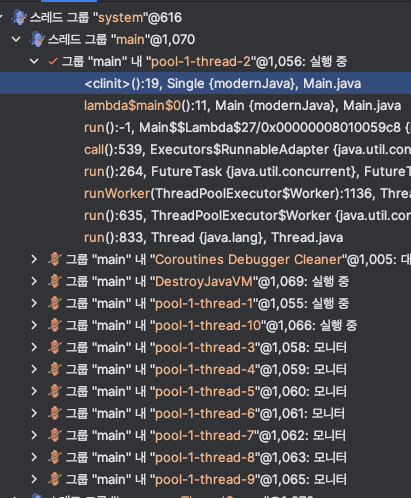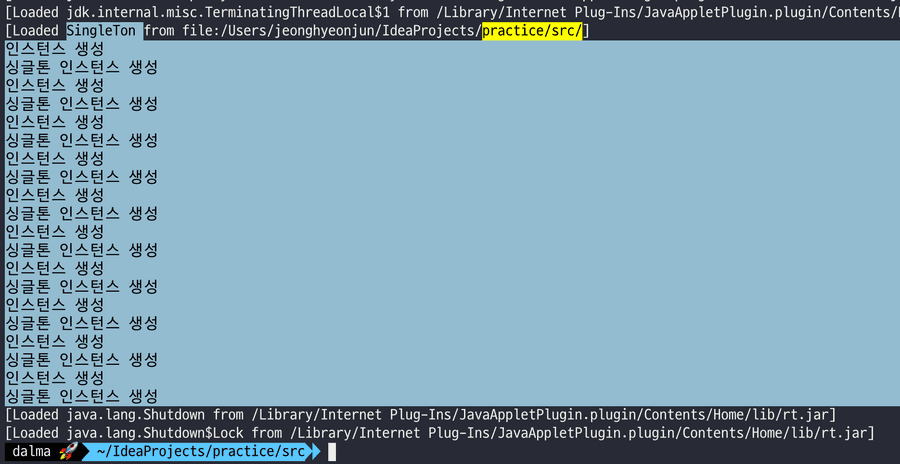클래스 로딩
- 클래스의 완전한 이름을 보고 해당 클래스를 정의하는 바이너리 바이트 스트림을 JVM 메모리에 올리는 작업을 의미한다.
- JVM은 실행될 때 모든 클래스를 메모리에 올리지 않고 필요할 때 마다 클래스를 메모리에 올린다.
- 클래스 로딩의 메커니즘은 로딩 → (검증 → 준비 → 해석) → 초기화 → 사용 → 언로딩 과정이 존재하며 이번 게시글에서는 로딩 단계를 확인한다. (위에 작성한 과정의 순서는 시작 지점 기준이다.)
java -verbose:class {파일 이름.java}명령어를 통해 클래스 로딩에 대한 상세 정보를 확인할 수 있다.
그럼 언제 클래스를 로딩할까?
첫 번째. initial class만 실행
class Main {
public static void main(String[] args){ }
}
class Single{
public Single() { }
}
Main클래스만 로딩 되었고Single클래스는 로딩되지 않음
두 번째. 다른 클래스의 인스턴스 생성
class Main {
public static void main(String[] args){
Single single = new Single();
}
}
class Single{
public Single() { }
}
Main이 실행되고Single클래스가 실행됨
세 번째. final 키워드가 없는 정적 변수만 호출
class Main {
public static void main(String[] args){
System.out.println(Single.a);
}
}
class Single{
public static int a;
}
Main이 실행되고Single클래스가 실행됨public static int a변수가 타입 기본값으로 출력됨
네 번째. final 키워드가 있는 정적 변수 호출
class Main {
public static void main(String[] args){
System.out.println(Single.b);
}
}
class Single{
public static int a;
public static final int b = 1000;
}
Main클래스가 로딩되고Single클래스가 로딩되지 않았지만public static final int b가 출력됨
다섯 번째. 정적 메서드 호출
class Main {
public static void main(String[] args){
Single.test();
}
}
class Single{
public static void test(){
System.out.println("static method 호출");
}
}
- Main과 Single 클래스 모두 로딩됨
여섯 번째. 클래스의 내부 정적 클래스의 정적 변수 호출
class Main {
public static void main(String[] args){
System.out.println(Single.INNER_INSTANCE.INSTANCE);
}
}
class Single{
public static class INNER_INSTANCE{
public static Single INSTANCE;
}
}
- Main 클래스와 Single$INNER_INSTANCE는 로딩되었지만, Single 클래스는 로딩되지 않음
정리
위의 테스트를 통해 두 가지 의문점이 생긴다.
첫 번째. static final 클래스 변수는 클래스 로딩이 필요없는가?
세 번째 테스트인 final 키워드가 없는 정적 변수를 호출하면 Single 클래스가 로딩되는 것을 확인할 수 있었다.
그 이유는 static final 클래스 변수는 컴파일 타임에 바이트 코드의 상수 풀에 채워지므로 클래스 로딩이 필요없는 것이다.
public static int a;
descriptor: I
flags: (0x0009) ACC_PUBLIC, ACC_STATIC
public static final int b;
descriptor: I
flags: (0x0019) ACC_PUBLIC, ACC_STATIC, ACC_FINAL
ConstantValue: int 1000
위의 바이트 코드를 확인하면 ConstantValue 속성에 실제 선언한 값이 인라인화 되어있는 것을 확인할 수 있다.
추가로 내부 정적 클래스의 클래스 변수에 접근하는 것도 Single 클래스가 로딩되지 않는 것을 알 수 있다. 실제로 Single$INNER_INSTANCE는 다른 클래스 파일로 컴파일되며, Single 클래스에 종속되지 않기 때문이다.
두 번째. 클래스는 한 번만 로딩됨을 보장한다.
자바 컴파일러는 변수 초기화와 정적 문장 블록, 부모 클래스의 인스턴스 생성자를 취합하여 <clinit>() 이라는 클래스 생성자를 자동으로 생성하며 작성된 순서의 영향을 받는다.
<clinit>()은 자바 언어에서 말하는 생성자와 다르며, 가상 머신 관점에서 인스턴스를 만드는 인스턴스 생성자는 <init>()이다.
(지금부터 clinit은 클래스 생성자, init은 인스턴스 생성자라고 부르겠다.)
자바 가상 머신은 클래스 생성자가 멀티스레드 환경에서 적절히 동기화되도록 해야 한다.
여러 스레드가 한 클래스를 동시에 초기화하려 시도하면 그중 한 스레드만 클래스 생성자를 실행하고 다른 스레드는 모두 대기시켜야 한다.
그렇기에 클래스 생성자에 오래 걸리는 작업이 포함되어 있다면 여러 스레드가 장시간 블록될 수 있기에 조심해야 한다.
class Main {
public static void main(String args[]) {
ExecutorService service = Executors.newCachedThreadPool();
for (int i = 0; i < 10; i++) {
service.submit(() -> {
new Single();
});
}
service.shutdown();
}
}
class Single {
static {
System.out.println(Thread.currentThread() + ": static 블록 호출 " + System.currentTimeMillis());
}
public Single() {
System.out.println(Thread.currentThread() + ": 생성자 호출 " + System.currentTimeMillis());
}
}
Thread[#25,pool-1-thread-1,5,main]: static 블록 호출 1727681233985
Thread[#34,pool-1-thread-10,5,main]: 생성자 호출 1727681233989
Thread[#27,pool-1-thread-3,5,main]: 생성자 호출 1727681233989
Thread[#30,pool-1-thread-6,5,main]: 생성자 호출 1727681233989
Thread[#32,pool-1-thread-8,5,main]: 생성자 호출 1727681233989
Thread[#28,pool-1-thread-4,5,main]: 생성자 호출 1727681233989
Thread[#31,pool-1-thread-7,5,main]: 생성자 호출 1727681233989
Thread[#29,pool-1-thread-5,5,main]: 생성자 호출 1727681233989
Thread[#33,pool-1-thread-9,5,main]: 생성자 호출 1727681233989
Thread[#26,pool-1-thread-2,5,main]: 생성자 호출 1727681233989
Thread[#25,pool-1-thread-1,5,main]: 생성자 호출 1727681233989
인스턴스 생성자는 동일한 시간대에 여러 번 호출된 것을 볼 수 있지만 클래스 생성자는 단 한 번만 호출된 것을 확인할 수 있다. 실제로 한 개의 스레드만 클래스 생성자 영역에 들어가게 되며 클래스 로더는 로딩부터 초기화까지 원자적인 연산이 보장된다.
ClassLoader의 loadClass 메소드를 참고하는 것도 좋을 것이다.
싱글 톤 인스턴스 만들기
- 실패 사례
class Main {
public static void main(String args[]) {
ExecutorService service = Executors.newCachedThreadPool();
for (int i = 0; i < 10; i++) {
service.submit(() -> {
SingleTon.getInstance();
});
}
service.shutdown();
}
}
class SingleTon {
private SingleTon() {
System.out.println("싱글톤 인스턴스 생성");
}
public static SingleTon instance;
public static SingleTon getInstance() {
if(instance == null){
System.out.println("인스턴스 생성");
return new SingleTon();
}
return instance;
}
}
- LazyHolder를 이용한 사례 (가장 권장되는 방법중 하나이다.)
import java.util.concurrent.ExecutorService;
import java.util.concurrent.Executors;
class Main {
public static void main(String args[]) {
ExecutorService service = Executors.newCachedThreadPool();
for (int i = 0; i < 10; i++) {
service.submit(() -> {
SingleTon.getInstance();
});
}
service.shutdown();
}
}
class SingleTon {
private SingleTon() {
System.out.println("싱글톤 인스턴스 생성");
}
public static SingleTon getInstance() {
return LazyHolder.INSTANCE;
}
// 클래스는 한 번만 로딩됨을 보장한다.
private static class LazyHolder {
private static final SingleTon INSTANCE = new SingleTon();
}
}
초기화는 언제 발생되나?
자바 가상 머신 명세에서는 로딩이 정확히 어떤 상황에서 시작해야 하는지 명시하지 않았다. 하지만 초기화 단계는 아래의 상황에 대해서는 즉시 시작하도록 규정해 놓았다.
간단한 사례를 확인하면 아래와 같다.
- 클래스 또는 인터페이스
T는 다음 중 하나가 처음 발생하기 직전에 초기화된다T는 클래스이고T의 인스턴스가 생성 될 때T의static메소드가 호출 될 때T의static변수가 할당 될 때T의final이 아닌static변수가 사용될 떄 (final로 지정된 정적 필드는 컴파일 타임에 상수 풀에 채워지므로 예외)
- 이전에 초기화되지 않은 경우 클래스가 초기화되면 해당 슈퍼 클래스가 초기화된다.
static필드에 대한 참조은 하위 클래스, 하위 인터페이스 또는 인터페이스를 구현하는 클래스의 이름을 통해 참조될 수 있지만 실제로 필드를 선언하는 클래스 또는 인터페이스만 초기화한다.java.lang.reflect패키지 등 표준 클래스 라이브러리에서 제공하는 리플렉션을 사용할 때 해당 클래스가 초기화되어 있지 않다면 초기화를 촉발한다.- 인터페이스의 초기화는 그 자체로 그 슈퍼 인터페이스의 초기화를 일으키지 않으며, 인터페이스에 디폴트 메서드를 정의했다면, 해당 인터페이스를 직간접적으로 구현한 클래스가 초기화될 때 인터페이스부터 초기화한다.
java.lang.invoke.MethodHandle인스턴스를 호출할 때 해당하는 클래스가 초기화되어 있지 않았다면 초기화를 촉발
부모클래스는 자식클래스보다 먼저 초기화된다.
class Super {
static { System.out.println("Super Init"); }
}
class One {
static { System.out.println("One Init"); }
}
class Two extends Super {
static { System.out.println("Two Init"); }
}
class Main {
public static void main(String[] args) {
One o = null;
Two t = new Two();
}
}
Super Init
Two Init
부모 인터페이스는 자식 인터페이스가 호출하여도 초기화 하지 않는다.
interface A {
int A = 1;
int AA = Main.out("AA", 2);
}
interface B extends A {
int B = Main.out("B", 3);
int BB = Main.out("BB", 4);
}
interface C extends B {
int C = Main.out("C", 5);
int CC = Main.out("CC", 6);
}
class Main {
public static void main(String[] args) {
System.out.println("B.A : " + B.A);
System.out.println("C.B : " + C.B);
System.out.println("C.C : " + C.C);
}
static int out(String s, int i) {
System.out.println(s + " = " + i);
return i;
}
}
B.A : 1
B = 3
BB = 4
C.B : 3
C = 5
CC = 6
C.C : 5
초기화 진행 순서
class Main {
public static void main(String[] args) {
new Single();
}
}
class Single {
static int A = 0;
static int B = 0;
public Single() {
System.out.println("3. 생성자");
}
static {
System.out.println("A : " + A);
System.out.println("B : " + B);
A = 10;
B = 20;
System.out.println("1. 정적 블록");
}
public static Temp temp = new Temp();
public static void StaticClass(){
System.out.println("X. 정적 메서드");
}
public static class InnerClass{
static {
System.out.println("X. 내부 클래스");
}
}
}
class Temp {
public Temp () {
System.out.println("2. 정적 변수");
}
}
A : 0
B : 0
1. 정적 블록
2. 정적 변수
3. 생성자








